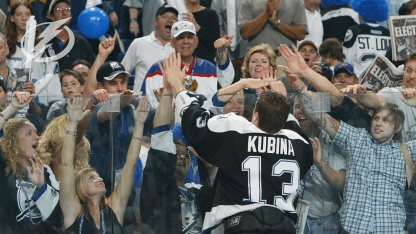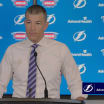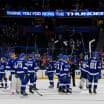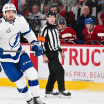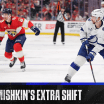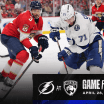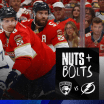Ahead of Game Seven in the 2004 Stanley Cup Final, Pavel Kubina received a signal of sorts as he was making the short walk from the team hotel to AMALIE Arena.
That memory still hasn’t faded, even 21 years later.
“I was walking right next door to the game and thinking, ‘This is it. Game Seven.’ The city was going crazy, and there were a lot of people outside and all of that. And right before I got to the arena, a good storm came in with a lot of lightning. I was a little nervous, but I'm thinking, ‘Hey, if I see lightning before a game and I'm still outside, that's a good sign for us. I think we're gonna win this game.’ And obviously we won 2-1,”Kubina said.
“It wasn't even raining,” he continued as he thought back to that day. “I just saw a lot of lightning around the arena. And I'm like, ‘Hey, this is meant to be.’ We’re the Tampa Bay Lightning and we have lightning around the arena a couple hours before a game. I'm like, ‘Oof, that's a good sign.’ We won that game and we felt that energy that entire Game Seven with people standing on their feet.”
Kubina, a defenseman who patrolled the Lightning blue line for parts of 10 seasons and whose 72 goals remain second-most by any defender in franchise history, said Tampa Bay’s push for the Stanley Cup in 2004 actually began the season prior.
The Lightning advanced to the second round of the 2003 Stanley Cup Playoffs, falling in five games to Martin Brodeur and the New Jersey Devils. A young team of Lightning players—and their fans—got their first taste of what it takes to win in the playoffs, and they used that to their advantage the following season.
Kubina credited former General Manager Jay Feaster and the rest of the Lightning front office staff for keeping that motivated, young core of players together. He mentioned Vincent Lecavalier, Freddy Modin, Nikolai Khabibublin and others who experienced the bitter feeling of the previous season ending before they felt it should have.
“So I think they got us by knowing how to win in the playoffs, which we had zero. We had no experience yet. So, I think that helped for the 2004 season. Management and the players, we grew as a team,” Kubina said. “We had been playing with the same 10 to 12 guys on the team for three to five years. So that helped a lot as a young team, and it showed in 2004.”
Tampa Bay won their conference quarterfinal matchup against the New York Islanders 4-1 before sweeping the conference semifinal round, defeating the Montreal Canadiens in four games.
The Lightning then beat the Philadelphia Flyers in Game Seven of the Eastern Conference Final before advancing to win the Stanley Cup Final by beating the Calgary Flames in another seven-game series.
“That really helped after the first and second round because now we really start believing, ‘Hey, we could do this.’ I’m not saying that it was easy,” Kubina said, “but that helped us for those longer rounds against Philadelphia and then obviously against Calgary.”
The Lightning forced a winner-take-all Game Seven on Martin St. Louis’ double overtime game-winning goal in Game Six on June 5, a game that included an assist from Kubina on the game-opening goal.
Heading into Game Seven, Kubina said the locker room was blanketed by a widespread, silent focus. The Lightning were motivated, and so were their fans.
It showed in the game, as Tampa Bay took a 2-0 lead behind two Ruslan Fedotenko goals and limited Calgary to 17 shots on goal in a 2-1 win.
“It was amazing,” Kubina said of Game Seven. “The city, the people outside and inside, people standing on their feet. That whole Game Seven, you’re never going to forget that.”
As this year’s Lightning team prepares for its own playoff journey, Kubina said a similar energy is likely. Those are the games you want to attend, according to the Stanley Cup champion.
“In the playoffs you go 110%. You see guys getting beat up and playing through injuries…you have two good teams going against each other and people are laying their bodies in front of pucks flying 100 mph,” Kubina said.
He called the playoffs “amazing”.
“The whole city goes crazy about it. Fans are more excited, I guess players get more excited, and you just feel like this could be the last couple of games. If you lose, you're done. So I think the game, it's more physical, faster, more fighting. I think fans like that. For fans, if they’ve never been to the playoffs, I would say, buckle up. Go see a lot of physicality, a lot of fights and a lot of good games.”

